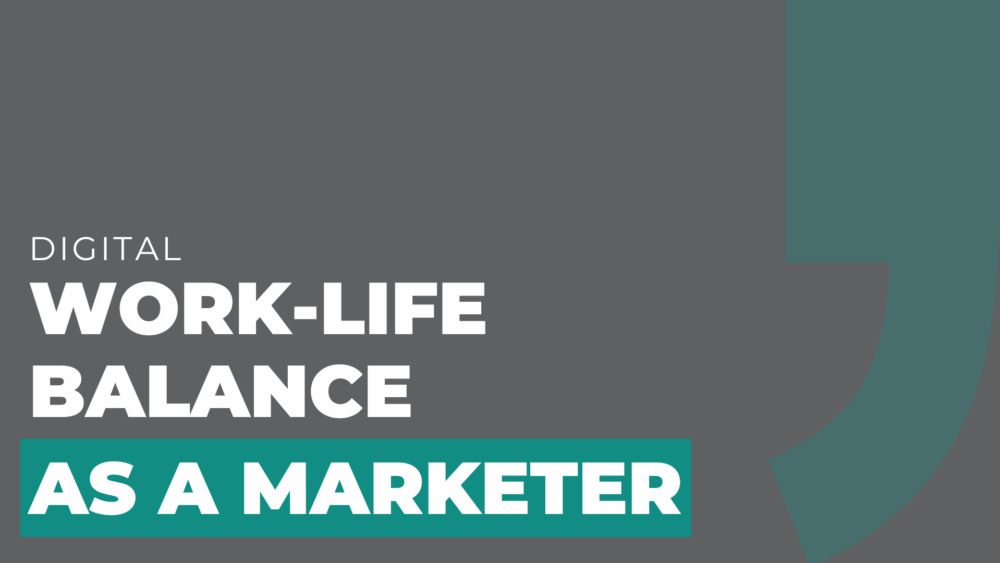In the fast-paced and ever-evolving world of marketing, striking the right balance between the oIn marketing, it can feel like you’re expected to be everywhere at once—running campaigns, answering late-night emails, and staying ahead of every trend.
Trying to achieve work-life balance in marketing: balance your life and your job doesn’t just sound challenging. Some days, it feels downright impossible.
But it doesn’t have to stay that way.
With the right strategies and a commitment to protecting what matters most, you can build a career that’s successful without sacrificing your health or personal life.
MOCK, the Agency has helped countless marketing teams find a better way.
The Struggle is Real
Balancing your personal life with a demanding marketing role isn’t just hard—it can feel relentless.
When you’re leading campaigns, supporting sales, and racing to meet tight deadlines, work seeps into every corner of your life.
The drive to stay relevant, innovative, and available around the clock leaves many marketers drained.
Yet pushing yourself past your limits isn’t the badge of honor it’s often made out to be.Without clear boundaries, the pressure to always deliver will erode your health and relationships.

Why Work-Life Balance in Marketing Matters
Creating a sustainable work-life balance in marketing is more than a feel-good goal—it’s essential for long-term success.
Without rest and space to recharge, even the most talented marketers experience:
- Creative fatigue and lack of focus
- Emotional exhaustion and resentment
- Health issues like chronic stress and insomnia
When work consumes every waking hour, it leaves little energy for what matters most: family, friends, hobbies, and your own well-being.Balanced professionals not only enjoy richer personal lives but also produce higher-quality work.

Common Problems Marketing Managers Face
If you’ve ever felt overwhelmed by the demands of your role, you’re not alone.
Here are some of the most significant challenges that drain marketers:
- Always being “on.”
The expectation to respond to emails and updates at all hours. - Deadline-driven culture.
Campaign launches and client deliverables create constant urgency. - Unpredictable demands.
A single phone call can upend your entire week. - Difficulty saying no.
Fear of missing out or appearing uncommitted pushes you to take on too much.
Recognizing these obstacles is the first step toward meaningful change.
Setting Clear Boundaries
To build work-life balance in marketing, you must set—and enforce—healthy boundaries.
The Problem: Your workday never seems to end.
Three Solutions:
- Define clear start and end times and communicate them to your team.
- Create a designated workspace at home to separate work from life.
- Silence notifications and avoid checking emails after hours.
Best Solution: Start by communicating your work hours openly—once everyone knows your schedule, it becomes easier to stick to it and protect your personal time.

Protecting Your Alone Time
In a role that requires constant collaboration and problem-solving, alone time is critical.
Use it to:
- Reflect on what’s working and what isn’t
- Reconnect with your goals
- Recharge creatively
Schedule time each week just for yourself, whether it’s reading, exercising, or simply resting.
Treat this appointment as non-negotiable.When you protect your space to decompress, you’ll return to work refreshed and more effective.

Handling Crises Without Burning Out
Emergencies are part of any marketing career.
When a campaign goes sideways or a client needs immediate action, you can’t always avoid the pressure.
But you can prepare.
Develop a clear crisis plan:
- Define roles and responsibilities
- Establish communication protocols
- Create checklists for common scenarios
Afterward, take time to debrief and learn from the experience.
Preparedness turns chaos into a manageable process.
Dealing with a Demanding Boss
Navigating a boss with high expectations requires clear communication and proactive planning.
Instead of simply agreeing to every request, have honest conversations about your capacity.
Frame your responses as solutions, like:
“To meet this timeline, I’ll need to shift priorities or bring in additional help.”
Use project management tools to show progress transparently.
When leaders see your workload mapped out, they’re often more willing to adjust expectations.
If stress persists, remember your well-being comes first.
Sometimes the healthiest move is to explore new opportunities that align with your values.
Separating Work and Family
Marketing roles can easily blur the line between your job and home life.
To protect your relationships:
- Set a clear end to your workday
- Silence notifications after hours
- Establish a dedicated workspace if you work remotely
When you’re with your family, be fully present.
Turn off devices, step away from emails, and focus on the people who matter most.
Strong personal relationships aren’t just comforting—they give you the resilience to thrive professionally.
Bottom line: Protecting your family time doesn’t mean you care less about work—it means you’re committed to showing up as your best self in both worlds.
Why Balance Fuels Long-Term Success
Work-life balance in marketing: balance your life and your job isn’t about doing less—it’s about doing better.
When you carve out time for rest and connection, you’re not stepping away from your ambitions.
You’re protecting your most valuable asset: your health.
Balanced marketers have:
- Sharper focus
- Higher creative output
- Stronger problem-solving skills
And most importantly, they sustain their success over the long term.
At the End of the Day
Work-life balance in marketing isn’t a luxury—it’s a necessity.
Setting boundaries, protecting your time, and maintaining strong relationships will help you build a career that feels sustainable and rewarding.
MOCK, the Agency has seen firsthand that marketers who prioritize balance are more resilient, creative, and fulfilled.
Take time today to reflect on your habits.
Set clear expectations, communicate openly, and make space for what fuels you.
When you care for yourself, you create the foundation for a career—and a life—that you truly love.
Ready to Build a More Balanced Marketing Career?
Let’s make marketing feel less like a grind—and more like what you love.
Reach out today to get started.
- Website: https://mocktheagency.com/
- Phone: 470-225-6814
- Email: hello@mocktheagency.com
- Address: 247 14th St NW, Atlanta, GA 30318


Comments are closed.